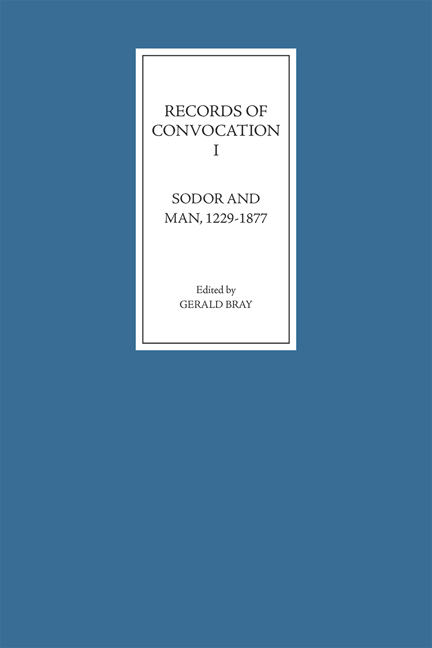Book contents
- Frontmatter
- Content
- Editor's Note
- Introduction
- Pre-Reformation Statutes
- The Book of Spiritual Laws and Customs, 1577
- Spiritual Ordinances of 1594
- The Customary Laws Of 1598
- Early Seventeenth-Century Convocations
- Spiritual Ordinances and Customary Laws, 1643
- The Injunction of 1658
- The Instructions of Bishop Barrow, 1663
- The Accustomed Unwritten Ecclesiastical Laws, 1667
- The Convocations Of 1680
- The Convocation Of 26 July 1683
- The Convocation Of 17 August 1685
- The Proclamation of Bishop Levinz, 1690
- The Act Against Non-Residence, 1696
- The Convocation of 3 February 1704
- The Convocations Of Bishop Thomas Wilson, 1704-54
- Bishop Mark Hildesley (1755-72)
- Bishop Richard Richmond (1773-80)
- Bishop George Mason (1780-3)
- Bishop Claudius Crigan (1784-1813)
- Bishop George Murray (1814-27)
- Bishop William Ward (1828-38)
- Bishop James Bowstead (1838-40)
- Bishop Henry Pepys (1840-1)
- Bishop Thomas Vowler Short (1841-6)
- Bishop Walter Augustus Shirley (1846-7)
- Bishop Robert John Eden (1847-54)
- Bishop Horatio Powys (1854-77)
- Bishop Wilson's Parochial Libraries
- Bishops in the Isle of Man
- Lords of Man
- Governors and Lieutenant-Governors of the Isle of Man
- The Parishes and Chaplaincies of the Isle of Man
- Chronological List of the Clergy by Parishes
- Index of the Clergy (Alphabetical)
- Bibliography
- Index of References to Holy Scripture
- Index of Persons and Places
- Index Of Subjects
Early Seventeenth-Century Convocations
Published online by Cambridge University Press: 12 January 2024
- Frontmatter
- Content
- Editor's Note
- Introduction
- Pre-Reformation Statutes
- The Book of Spiritual Laws and Customs, 1577
- Spiritual Ordinances of 1594
- The Customary Laws Of 1598
- Early Seventeenth-Century Convocations
- Spiritual Ordinances and Customary Laws, 1643
- The Injunction of 1658
- The Instructions of Bishop Barrow, 1663
- The Accustomed Unwritten Ecclesiastical Laws, 1667
- The Convocations Of 1680
- The Convocation Of 26 July 1683
- The Convocation Of 17 August 1685
- The Proclamation of Bishop Levinz, 1690
- The Act Against Non-Residence, 1696
- The Convocation of 3 February 1704
- The Convocations Of Bishop Thomas Wilson, 1704-54
- Bishop Mark Hildesley (1755-72)
- Bishop Richard Richmond (1773-80)
- Bishop George Mason (1780-3)
- Bishop Claudius Crigan (1784-1813)
- Bishop George Murray (1814-27)
- Bishop William Ward (1828-38)
- Bishop James Bowstead (1838-40)
- Bishop Henry Pepys (1840-1)
- Bishop Thomas Vowler Short (1841-6)
- Bishop Walter Augustus Shirley (1846-7)
- Bishop Robert John Eden (1847-54)
- Bishop Horatio Powys (1854-77)
- Bishop Wilson's Parochial Libraries
- Bishops in the Isle of Man
- Lords of Man
- Governors and Lieutenant-Governors of the Isle of Man
- The Parishes and Chaplaincies of the Isle of Man
- Chronological List of the Clergy by Parishes
- Index of the Clergy (Alphabetical)
- Bibliography
- Index of References to Holy Scripture
- Index of Persons and Places
- Index Of Subjects
Summary
The convocation of 1607195
At a convocation and court holden before the reverend father in God John Philips, lord bishop of Man, the third day of December 1607, in Church Peelers in Holland,196 it is decreed as followeth:
Whereas there is a reference from the king's majesty unto the reverend father in God, John, lord bishop of this isle, as appeareth under Sir Julius Caesar his hand,197 for the hearing and determining of the controversy depending between Sir Nicholas Thompson and Sir Christopher Yonge, clerks, concerning the rectory of Ballalaighe [Ballaugh]. And forasmuch as the said Christopher Yonge is absent and now in England, it is therefore decreed by the said reverend father, that he the said Christopher Yonge shall have time to come in and make his personal appearance in Ballalaighe [Ballaugh] church, before the said reverend father, on Friday in Easter week next coming, being the first day of April 1608 [1 April 1608] between the hours of nine198 and eleven in the forenoon the foresaid day, to the end, he the said Sir Christopher Yonge may there and then allege for himself what he can in that cause, and that the said reverend father may proceed to a final determination thereof, according to his majesty's good pleasure.
Thereupon a process given and granted by the foresaid reverend father after the manner of this isle, according to the decree for his appearance. Concordat in decreto. Iohannes Cosnahan, registrarius.
Yonge apparently did not appear and Thompson was confirmed in the living, with Yonge ordered to pay damages to him, on 21 September 1608.
The convocation of 1610199
At a convocation holden the 23 of January 1609 before the reverend father in God John, lord bishop of Man, in Church Peelers in Hollandtown.
It is decreed that Sir Nicholas Thompson and Sir Christopher Yonge, clerks, shall make their personal appearance in St Mary's church in Ballalaighe [Ballaugh] before the ordinary, the sixth day of February being Tuesday [6 February 1610] between the hours of nine and eleven of the clock in the forenoon the foresaid day, and there and then to know his further pleasure and not to fail, sub poena suspensionis.
Thereupon a process given and granted by the foresaid reverend father for their appearance according to the decree. Concordat in decreto.
- Type
- Chapter
- Information
- Records of Convocation , pp. 81 - 84Publisher: Boydell & BrewerFirst published in: 2024

